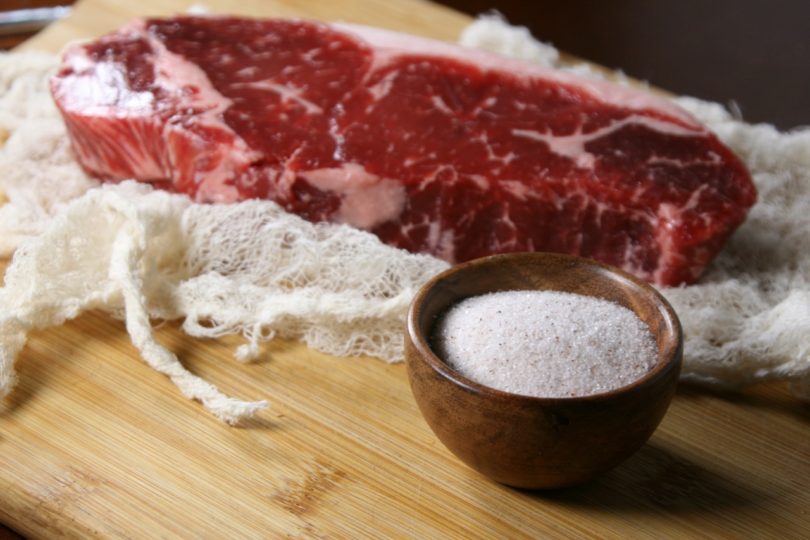As someone who’s tried out many different diets over the last 10 years, I heard about the carnivore diet and naturally was curious to try it. And honestly, my first impression was that it had to be a joke, or someone taking keto way too far. But after seeing an interview about Mikhaila Peterson, a girl who effectively reversed her autoimmune symptoms using a carnivore diet — sometimes referred to as zero carb — I was ready to try it. Here’s what happened to me after two weeks (15 days) of eating nothing but meat.
Weight Loss on the Carnivore Diet
In two weeks, I lost about 11 lbs. The weight loss was slow in the first few days, but by the end I was losing weight steadily — nearly a pound a day. Glycogen and water loss are known to be factors in the initial weight reduction on low carb-type (keto) diets. What happens is the body’s stores of glycogen (glucose stored in the liver and muscle tissues to be made into ATP when fasting) get used up first. Later, the body becomes “fat-adapted” and switches over to using ketone bodies as fuel. This varies from person to person, as some retain more water than others. When glycogen and its accompanying water are used up without being replaced, weight loss is inevitable.
It’s not uncommon for people to switch from a high-carb to a lower- or no-carb diet and shed several pounds without reducing calories, increasing exercise or changing anything else. However, weight loss isn’t to be confused with fat loss, and this weight is sure to return when carbs are reintroduced or increased to normal levels.
All Meat Diet and Energy
The first few days, my energy was incredible. My thoughts were clearer than usual and I wasn’t struggling to maintain good energy in the afternoons, which can be a challenge for me. Even before eating anything in the mornings, as well as between meals, I felt fueled and never tired or drained. This was a really nice perk of being carb-free. However, this changed drastically by the middle of the second week. My energy levels suddenly tanked and I began feeling brain fog, anxiety and exhaustion.
Carnivore Diet Worked Magic on Digestion/Bloat
Each passing day, my stomach grew flatter and inflammation throughout my body seemed to reduce. I didn’t measure this, but my rings were falling off my fingers by the end. My face looked a little less puffy, and even after meals my stomach never expanded. My digestion was good. Many people report smaller bowel movements on an all-meat diet and I would agree.
A note on fiber: One of the controversies with a zero carb/carnivore diet is the lack of dietary fiber. Since the 1970s, fiber has been touted as the digestion nutrient, helping to move things along, so to speak. However, science is starting to take another look at how fiber affects digestion. Studies have shown that stopping or reducing dietary fiber can have a significant improvement in digestive symptoms vs. a high-fiber diet. Better to be more careful about the over-ingestion of refined carbohydrates.
Gut Reaction
Proponents of the carnivore diet also believe that the complete abstinence of carbs will cause the many undesirable fiber-fermenting bacteria living in the gut to die off. Humans have evolved to live symbiotically with bacteria though, as they help us to absorb some nutrients from food and even synthesize some vitamins. In the case of a carnivore diet, the gut populates with amino acid-fermenting microbes and many or all of the fiber fermenters slowly die off. This could be a great thing for someone who’s living with a bunch of candida overgrowth, SIBO, h. pylori etc. Too much or the wrong kinds of bacteria in the body may warrant a slate-clearing to start again. For many, this may be one of the reasons for their reduced abdominal bloat and distention. On the other hand, if a lot of the carbohydrate-digesting bacteria in the gut leaves, reintroducing those foods down the line could mean digestive troubles without the right bacteria to break them down.
Skin
My skin felt clear, soft and radiant on carnivore. High-fat diets seem to lubricate my vata (ayurvedic dosha/body type) skin without making it overly oily or blemish prone. Dryness wasn’t an issue either.
Sleep
The first week, my sleep quality improved. I normally struggle with night sweats, waking up frequently, and I never remember my dreams. The first few days on the diet, my fevers reduced and I was waking up sweat-free, which improved as time went on. Towards the last half of week two, however, I started having trouble sleeping through the night again, which seemed to correlate with my increased adrenal fatigue/HPA-axis imbalance at that time. Adrenal fatigue = cortisol imbalance = no bueno for sleep.
My Take
While I did notice some health improvements — at first — on a zero-carb, carnivore diet, the adrenal fatigue symptoms that set in the second week outweighed any benefits I experienced throughout the 15 days. For me it wasn’t wildly different than ketogenic or low-carb diets I’ve done in the past (other than being much more limited). As someone who loves vegetables and getting creative in the kitchen, it seemed to take away from my life more than it added. Food is there to sustain our lives, sure, but it’s also a point of culture, pleasure and enjoyment.


